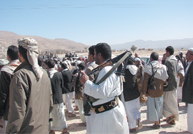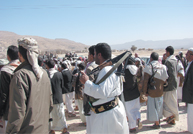
Arms-carrying ban leads to a 39 percent decrease in crime [Archives:2008/1125/Front Page]
January 28 2008
 |
SANA'A, Jan 30 ) Fifty eight lives had been saved in four months because of the weapons ban strategy activated by the Ministry of Interior in August last year.
Mohammed Abdullah Al-Qawsi, deputy minister of interior for the security section and director of the weapon banning project in the secretariat, explained that this time the weapons banning strategy has proved more effective compared to previous times.
“The law on possessing arms is now pending in the Parliament and waiting for approval. Our previous strategies were not as effective because we were not as strict or as comprehensive,” said Al-Qawsi.
The previous strategy began in mid-2006, and only 16,000 weapons were seized between then and mid-2007. In the first four months of this strategy, 70,000 pieces were collected, which is an 87 percent increase.
Al-Qawsi says this strategy is stricter with “no exceptions.” The type of banned weapons have changed too, as this time it is allowing only concealed pistols, while last time it allowed hand guns and Kalashnikovs. The third point that Al-Qawsi attributed to the strategy's success is the media campaign that accompanied the strategy.
Possessing vs. Carrying
The strategy, in essence, does not prevent possessing arms or weapons. The law allows every citizen to own light arms but does not allow them to carrying arms in public. This misunderstanding causes tribal people and other citizens to hesitate before registering their weapons. Every citizen is required to register the type and number of weapons they have, in order to assist in crime investigations, according to the weapons sector at the Ministry of Interior.
The local community has shown widespread support for this campaign by reporting cars or people carrying weapons. Most calls have come from near Sana'a and Aden.
Resistance
Contradicting some reports in the media, there was no violent resistance against the police who stopped arms-carrying in public. Even influential tribal sheikhs let the security people take their arms without resorting to violence. Mareb and Jawf are the two governorates where the strategy is being implemented slowly and thoroughly. Al-Qawsi said that de-arming is a process, and he hoped that with time, the main cities will be completely weapon free.
“If there is anyone who thinks they are above the law, we let them understand exactly where they stand,” insisted Al-Qawsi.
As people become more dependent on the legal system and look for peaceful solutions to settle their disputes, the number of crimes caused by weapons has decreased by 41 percent.
——
[archive-e:1125-v:15-y:2008-d:2008-01-28-p:front]


